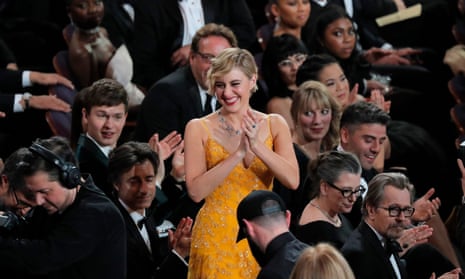Organisers of the 2018 BFI London film festival have said they are moving in the right direction when it comes to gender representation, unveiling a programme in which 38% of directors are women.
On Thursday details were announced for the 62nd edition of the festival, one which will include the world premiere of Stan & Ollie, starring Steve Coogan and John C Reilly, and the UK premiere of Mike Leigh’s Peterloo, which will be screened in Manchester, a festival first.
Tricia Tuttle, this year’s artistic director, said the fair representation of female directors was a priority but they had ruled out setting quotas.
In bare statistical terms 38% of the directors in the programme are women. For features the figure is 30%, up from 24% last year. In three of the four competition strands the gender split was 50-50.
“We are moving in the direction we all want to be moving and we are seeing lots of really exciting new female film-makers coming through the programme,” said Tuttle.
Gender inequality has been more entrenched in the film industry than possibly any other cultural sector but Tuttle said things seemed to be changing. It had not been difficult or challenging to find more films directed by women, she said.
“While we all want to move towards parity, we don’t want to set quotas for ourselves. We are trying to serve audiences and serve the programme and that is always at the heart of our curatorial process.
“We always talk about where the film comes from and who made it and how that fits in to the overall texture of the programme in terms of global diversity, gender diversity … but we haven’t set out to say 50% has to be female film-makers.”
The gender representation at London is in stark contrast to that at Europe’s other big film festivals. At Venice, only one of the 21 films in competition is directed by a woman, The Nightingale by Jennifer Kent. At Cannes this year it was only slightly better, with three out of 20 film-makers female.
At the Baftas this year, for the fifth year running, no woman was included in the best director category. At the Oscars, Greta Gerwig became only the fifth woman to be nominated for best director.
The London festival is a major event in the film calendar, although not quite on the level of Cannes, Venice and Toronto, which together hoover up the world premieres of films which are seen as likely award-season contenders.
There will be 21 world premieres in London and 29 European premieres, including Steve McQueen’s Widows, adapted from the Lynda La Plante TV series, and Jason Reitman’s The Front Runner, chronicling the rise and fall of the would-be 1988 Democrat presidential candidate Gary Hart.
Other films in the programme include the Coen brothers’ new film The Ballad of Buster Scruggs, an anthology of six mini-westerns; and Alfonso Cuarón’s black and white Roma, described by Tuttle as “a love letter to the women who raised him and a real delight”.
Tuttle said it was striking how many films this year were based on true stories. They include David Mackenzie’s Robert the Bruce biopic for Netflix, Outlaw King; Matthew Heineman’s A Private War, starring Rosamund Pike as Sunday Times foreign correspondent Marie Colvin; and Marielle Heller’s Can You Ever Forgive Me? the true story of celebrity biographer and letter forger Lee Israel, starring Melissa McCarthy.
Tuttle, standing in for Clare Stewart, who is on a year-long sabbatical, said championing female talent and British films were a priority for her. “I love British film,” she said. “I’m a North Carolinian by birth but I’ve been here for 20 years and it always struck me when I came to this country how, at that time, the UK didn’t understand what an incredible film industry there was.”
One film to watch out for this year, she said, is Wild Rose, written by Nicole Taylor and directed by Tom Harper. It tells the story of a Glasgow singer and single mum (played by Jessie Buckley) who dreams of becoming a country star in Nashville. “I think it is going to be a film that gets audiences really excited this year.”
